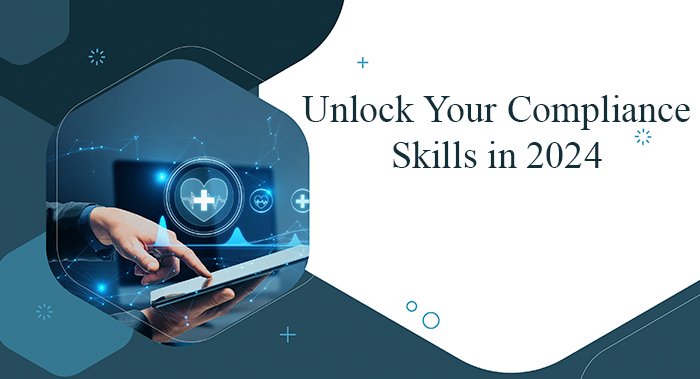Unlock Your Compliance Skills in 2024

It is expected that healthcare organizations possess unique compliance skills to stringent regulations, safeguard patient data, maintain ethical practices, and ensure the delivery of high-quality care. The year 2023 was driven by many increased regulatory, security, and technological advancements. So, there are surely many challenges in 2024 that will impact the healthcare sector extensively. Complete knowledge of the updates and compliance requirements through healthcare compliance webinars, reliance sources, articles, and more can help healthcare professionals and providers boost their skills.
What Do You Mean by Healthcare Compliance in 2024?
Healthcare compliance in 2024 for the US involves adhering to evolving regulations, ethical standards, and technological advancements. It encompasses ensuring patient data security, following updated HIPAA guidelines, and embracing AI-driven solutions while maintaining ethical treatment standards. With a focus on interoperability, healthcare compliance now necessitates seamless data exchange among providers, prioritizing patient privacy. Telehealth regulations and remote care protocols are central, guaranteeing quality while expanding access.
Additionally, compliance extends to pharmaceuticals, involving stringent oversight of drug development, testing, and distribution. The landscape demands adaptability to novel challenges, emphasizing a patient-centric approach while integrating cutting-edge technology within a robust ethical framework.
Healthcare Compliance Challenges in 2024
In 2024, healthcare compliance confronts multifaceted challenges, and some of the biggest challenges are listed below:
Artificial Intelligence (AI)
In the US, AI in healthcare faces a dual challenge of innovation and integration. While AI promises enhanced diagnostics, personalized treatment, and streamlined processes, its implementation encounters hurdles. Interoperability issues among diverse systems hinder seamless data sharing, impeding AI’s full potential. Privacy concerns and regulatory complexities, especially under HIPAA, pose significant barriers to data access and utilization. Additionally, ensuring AI algorithms are unbiased and ethical remains pivotal to fostering trust among healthcare professionals and patients. Bridging these gaps demands collaborative efforts, robust infrastructures, stringent regulations, and continuous refinement to harness AI’s transformative capacity while upholding patient welfare and privacy.
OIG Guidance
On November 6, 2023, the Office of the Inspector General (OIG) implemented the initial revisions to the General Compliance Program Guidance (GCPG) after nearly three decades. While these updates don’t establish fresh laws or legal duties, they do revamp the original OIG guidelines, enhancing their relevance and usability for modern times. The updated guidance incorporates an array of compliance resources, including a dedicated section within the U.S. Department of Health and Human Services (HHS) OIG’s official release. This section offers a wealth of valuable and complementary resources, encompassing compliance toolkits, advisory opinions, healthcare fraud and enforcement standards, suggestions for enhancing your compliance program’s structure, provider training, and additional relevant materials.
Regulatory Compliance Challenge
In healthcare, following rules and regulations can be tough. There are many hurdles to jump over to make sure everything’s done right. Keeping up with ever-changing rules is a big challenge. Protecting patients’ personal health information (PHI) while sharing it when needed is another puzzle to solve. Making different systems talk to each other smoothly is tricky, too. Using cool new tech like AI and gadgets brings its own set of rules to follow. It’s like walking a tightrope: balancing between using these advancements for better care while following strict rules to keep everyone safe and secure.
Healthcare Compliance Skills in 2024
There are many healthcare regulations and amendments that healthcare organizations and professionals must comply with. For this, the following skills are important to embrace.
- Regulatory Agility: Rapidly grasping and implementing evolving healthcare laws and guidelines. Adapting strategies and protocols to align with updated compliance standards and swiftly navigating legal changes.
- Clinical Healthcare Skill: The world is already facing a shortage of healthcare professionals like doctors and nurses. So, the use of artificial intelligence and other tools is increasing rapidly, but these technological advancements cannot bestow human qualities. Hence, professionals should gleam up their emotional intelligence and empathy, improving their critical contribution.
- Data Security Expertise: Proficiency in safeguarding patient data by implementing stringent measures against breaches, ensuring privacy, and complying with HIPAA regulations to maintain confidentiality and integrity.
- Tech Integration Proficiency: Seamlessly incorporating innovative technologies into compliance frameworks, ensuring their seamless alignment with existing protocols and practices.
- Ethical Decision-Making: Upholding strong moral values in compliance practices, prioritizing patient well-being, fairness, and integrity in all decisions and actions. This not only furnishes the role of healthcare professionals but also ensures quality care for patients.
- Communication Mastery: Effective communication skills are essential in today’s landscape as they eradicate the chances of communication gap and set a successful business. Effectively conveying intricate compliance information to diverse audiences, facilitating clear understanding and seamless cooperation among stakeholders.
- Employee Training and Skill Development: Healthcare employees should understand their roles and duties in upholding compliance, including safeguarding patient privacy and security, adhering to moral billing standards, and reporting possible infractions of compliance.
- Cybersecurity Skills: Instances of data breaches, cyber assaults, and hacking endeavors continue to surge both in occurrence and impact. Concurrently, the repercussions for companies inadequately safeguarding their clients’ information are escalating. Amidst these dynamics, the demand for expertise in fortifying security measures and fostering resilience is anticipated to soar in 2024.
In 2024, the healthcare compliance landscape brims with challenges and opportunities. To navigate these complexities, honing skills via healthcare compliance webinars and reliable resources is vital. Embracing regulatory agility, data security expertise, tech integration proficiency, ethical decision-making, and adept communication can fortify professionals in meeting evolving demands and ensuring quality patient care amidst dynamic regulatory shifts and technological advancements.



